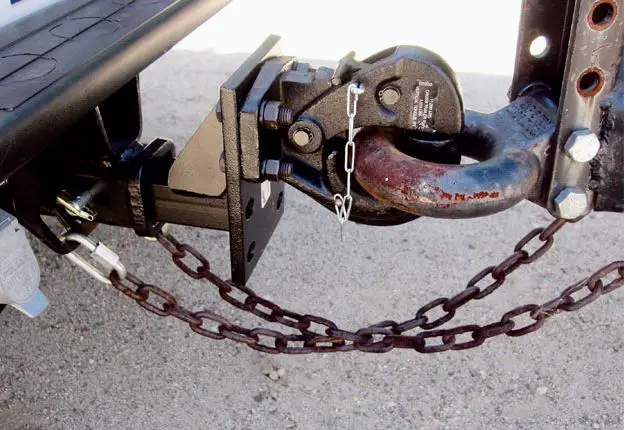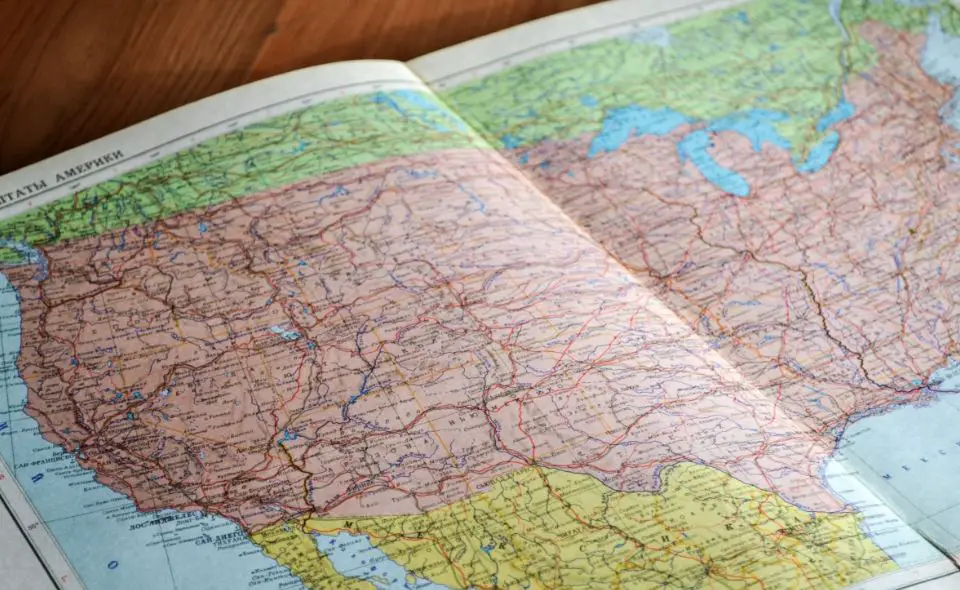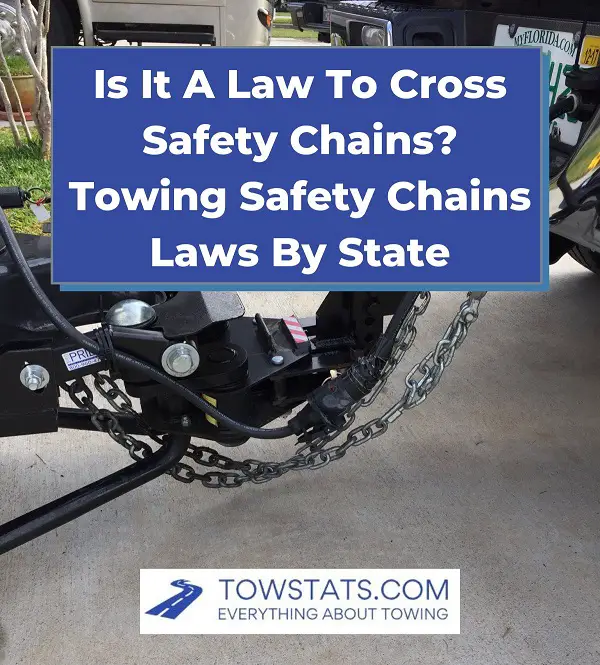Using safety chains while towing is a standard practice that is required in most states, but is it a law to cross safety chains?
There are only a few states with a law to cross safety chains, which are New York, Pennsylvania, Texas, and Washington.
Although most states don’t have a law requiring the crossing of safety chains, crossing them does have several benefits.
We’ll go further in depth on safety chain laws below for all the information you need to know to stay legal regarding safety chains.
Is It A Law To Cross Safety Chains?
There is no federal law and very few state laws (except New York, Pennsylvania, Texas, and Washington) requiring you to cross safety chains when towing a trailer.
However, there are plenty of common sense reasons to do so.
While there is no law requiring you to cross safety chains, that same Federal DOT Article states that at least one safety chain must be used when towing, and most states throughout the U.S. also require you to use safety chains.
Crossing those chains can help provide additional safety benefits with zero drawbacks or extra effort, so you should always cross them.
Why Cross Trailer Chains?

We already know the main reason for using safety chains, but why bother crossing them?
The main benefit of crossing your towing safety chains is that in the event that the coupler comes detached from the trailer ball, the trailer’s coupler will fall on the crossed chains below, preventing it from making contact with the ground.
In this case, the chains being crossed allow them to act as a basket or harness, preventing damage to your trailer coupler in case your trailer comes off your hitch during transport.
Federal Safety Chain Law
Federal Department of Transportation Title 49, Volume 4, Section 393 addresses safety chain law as follows:
(i) Safety chains or cables, when used as the safety device for that vehicle, may consist of either two chains or cables or a single chain or cable used alone
(ii) A single safety device, including a single chain or cable used alone as the safety device, must be in line with the centerline of the trailer tongue
(iii) The device may be attached to the converter dolly at any point to the rear of the attachment point of the tongue eye or other hitch device.
Safety devices other than safety chains or cables must provide strength, security of attachment, and directional stability equal to, or greater than, safety chains or cables installed in accordance with paragraphs (d) (5) and (6) of this section.
When two safety devices, including two safety chains or cables, are used and are attached to the towing vehicle at separate points, the points of attachment on the towing vehicle shall be located equally distant from, and on opposite sides of, the centerline of the towing vehicle.
Where two chains or cables are attached to the same point on the towing vehicle, and where a bridle or a single chain or cable is used, the point of attachment must be on the longitudinal centerline of the towing vehicle.
A single safety device, other than a chain or cable, must also be attached to the towing vehicle at a point on its longitudinal centerline.
Safety Chain Laws By State

In addition to the federal law requiring you to use at least one safety chain, each state has it’s own laws.
We’ll break each state’s safety chain laws here.
Alabama
No provisions found.
Alaska
Provisions per 13 AK ADC 04.275:
- At least one chain or cable required.
- Chain must be strong enough to retain control if tow bar or hitch fails.
- Chain must have no more slack than needed for proper turning.
- Chain must prevent tow bar from dropping if disengaged.
- Fifth Wheel kingpin hitches are exempt.
Arizona
No provisions found.
Arkansas
Provisions per A.C.A. § 27-35-111:
- At least one chain or cable required.
- Chain must be strong enough to retain control if tow bar or hitch fails.
California
Provisions per West’s Ann. Cal. Vehicle Code § 29004, 29004.5:
- At least one chain or cable required.
- Chain must be strong enough to retain control if tow bar or hitch fails.
- Chain’s breaking strength must be equal to or greater than the Gross Vehicle Weight of the towed vehicle.
- Chain must have no more slack than needed for proper turning.
- Chain must prevent tow bar from dropping if disengaged.
- Fifth Wheel kingpin hitches are exempt.
Colorado
Provisions per C.R.S.A. § 42-4-506:
- At least two chains or cables required.
- Chains must be strong enough to retain control if tow bar or hitch fails.
- Fifth Wheel kingpin hitches are exempt.
Connecticut
Provisions per Regs. Conn. State Agencies § 14-137-124:
- At least one chain or cable required.
- Chains must be strong enough to retain control if tow bar or hitch fails.
Delaware
No provisions found.
Florida
Provisions per West’s F.S.A. § 316.530:
- At least two chains or cables required.
- Chains must be strong enough to retain control if tow bar or hitch fails.
- Fifth Wheel kingpin hitches are exempt.
Georgia
No provisions found.
Hawaii
No state provisions found; each island’s government may have specific laws.
Illinois
Provisions per 625 ILCS 5/15-110 :
- At least two chains or cables required.
- Chains must be strong enough to retain control if tow bar or hitch fails.
Indiana
Provisions per IC 9-20-9-8 :
- At least two chains or cables required.
- Must attach one chain on each side of coupling at the extreme outer edge of the vehicle.
Iowa
Provisions per I.C.A. § 321.462:
- At least one chain or cable required.
- Chains must be strong enough to retain control if tow bar or hitch fails.
Kansas
Provisions per K.S.A. 8-1904 & K.S.A. 8-1907:
- Kansas does not define whether any safety chains must be used, simply that the drawbar, towbar, or other connections shall be of sufficient strength to pull and stop all weights towed.
Kentucky
No provisions found.
Louisiana
Provisions per LSA-R.S. 32:384 :
- At least one chain or cable required.
- Chains must be strong enough to retain control if tow bar or hitch fails.
- Chains are required on trailers with loaded gross weight capacity up to 6,000 lbs.
- Devices other than safety chains must be approved by the state.
Maine
Provisions per 29-A M.R.S.A. § 2385:
- At least one chain or cable required.
- Chains must be strong enough to retain control if tow bar or hitch fails.
- Chains or steel cables must be at least 1/4″ thick.
Maryland
Provisions per MD Code, Transportation, § 24-107 MD ADC 11.13.08.03 & 11.13.08.10:
- At least one chain or cable required.
- Chain must be strong enough to retain control if tow bar or hitch fails.
- Chain’s breaking strength must be equal to or greater than the Gross Vehicle Weight of the towed vehicle.
- Chain must have no more slack than needed for proper turning.
- Chain must prevent tow bar from dropping if disengaged.
- Fifth Wheel kingpin hitches are exempt.
- You can only tow a vehicle with another vehicle using a tow dolly.
Massachusetts
Provisions per 540 MA ADC 22.10:
- At least two chains or cables required.
- Chain must be strong enough to retain control if tow bar or hitch fails.
- Must attach one chain on each side of the central trailer hitch.
- Each chain must be independent of the other or the coupling.
- Each chain must have an ultimate strength at least equal to the gross weight of the trailer and it’s load.
Michigan
Provisions per M.C.L.A.257.721:
- At least two chains or cables required.
- Must attach one chain or cable on each side of coupling at the extreme outer edge of the trailer.
- Safety chains used in three-vehicle RV combinations must have a locking mechanism.
Minnesota
Provisions per M.S.A. § 169.82:
- At least two chains or cables required.
- Chain must be strong enough to retain control if tow bar or hitch fails.
- Chain must have no more slack than needed for proper turning.
- Chains must be permanently attached to the trailer, and need to be attached to the vehicle near the points of bumper attachment to chassis.
- Fifth Wheel kingpin hitches are exempt.
Mississippi
Provisions per Miss. Code Ann. § 63-5-25:
- At least one chain or cable required.
- Chain must be strong enough to retain control if tow bar or hitch fails.
- Chain must have no more slack than needed for proper turning.
- Chain must prevent tow bar from dropping if disengaged.
Missouri
Provisions per V.A.M.S. 307.170:
- At least one chain or cable required.
- Chain must be strong enough to retain control if tow bar or hitch fails.
- Fifth Wheel kingpin hitches are exempt.
Montana
Provisions per MCA 61-9-208:
- At least one chain or cable required.
- Chain must prevent tow bar from dropping if disengaged.
- Chains are required on trailers 3,000 lbs. GVWR or less and must be securely fastened to the towing unit.
- Steel chain or cable must be at least 1/4″ thick, and cannot be connected to the tow ball.
Nebraska
Provisions per Neb.Rev.St. § 60-6,246:
- At least two chains or cables required.
- Chain must prevent tow bar from dropping if disengaged.
Nevada
Provisions per NAC 484D.130:
- At least one chain or cable required.
- Chain must be strong enough to retain control if tow bar or hitch fails.
- Chain must have no more slack than needed for proper turning.
- Chain must prevent tow bar from dropping if disengaged.
- Chain must be able to hold the Gross Weight (GW) of vehicle or vehicles being towed.
New Hampshire
Provisions per N.H. Rev. Stat. § 266:63:
- At least one chain or cable required.
- Chain must be strong enough to retain control if tow bar or hitch fails.
- Chain must prevent tow bar from dropping if disengaged.
- Chain must be have ultimate strength of both the Gross Weight (GW) of trailer and load.
New Jersey
Provisions per N.J.S.A. 39:4-54:
- At least one chain or cable required.
- Chain must be strong enough to retain control if tow bar or hitch fails.
- Chain must prevent tow bar from dropping if disengaged.
- Chain must be strong enough to hold the towed vehicle or trailer on a hill to prevent it from rolling backwards.
New Mexico
No provisions found.
New York
Provisions per McKinney’s Vehicle and Traffic Law § 375 (29-a) & 15 NY ADC 57.3:
- At least one chain or cable required.
- Chain must be strong enough to retain control if tow bar or hitch fails.
- Chain must have no more slack than needed for proper turning AND must be of same length as any other chains used.
- Chain must prevent tow bar from dropping if disengaged.
- If using a single chain, attach it on the trailer’s longitudinal center line.
- If using two chains, attach them equal distance from and on opposite sides of the trailer’s longitudinal center line.
- Chains must be crossed under the tongue.
North Carolina
Provisions per N.C.G.S.A. § 20-123:
- At least two chains or cables required.
- Chain must be strong enough to retain control if tow bar or hitch fails.
- Chains must be strong enough to hold the gross weight of the trailer or towed vehicle.
- Fifth Wheel kingpin hitches are exempt.
- Chains are not required on trailers and semitrailers that have locking pins or bolts in the towing attachment to prevent disconnection, provided they are of sufficient strength and condition to hold the trailer’s gross weight.
North Dakota
Provisions per NDCC, 39-21-32 & ND ADC 37-06-03- 02 :
- At least two chains or cables required.
- Fifth Wheel kingpin hitches are exempt.
Ohio
Provisions per R.C. § 4513.32:
- At least two chains or cables required.
- Chain must be strong enough to retain control if tow bar or hitch fails.
- Chains must be strong enough to hold the gross weight of the trailer or towed vehicle.
- Chains must prevent tow bar from dropping if disengaged.
Oklahoma
Provisions per 47 Okl.St.Ann. § 12-405.1:
- At least two chains or cables required.
- Chains must be strong enough to retain control if tow bar or hitch fails.
- Chains must prevent tow bar from dropping if disengaged.
- Chains not required if using a safety device which provides strength, security of attachment, and directional stability all equal to or greater than that provided by safety chains.
Oregon
Provisions per § 818.150 & § 818.170:
- At least one chain or cable required.
- Chain must be strong enough to retain control if tow bar or hitch fails.
- Chan must offer no extra slack than what’s needed for proper turning.
- Chains must be offer tensile strength that is equal to the loaded weight of the trailer.
- Chains must prevent tow bar from dropping if disengaged.
Pennsylvania
Provisions per 75 Pa.C.S.A. § 4905:
- At least two chains or cables required.
- Chains must be crossed and of equal length to each other.
- Chains must be strong enough to retain control if tow bar or hitch fails.
- Chan must offer no extra slack than what’s needed for proper turning.
- Chains must prevent tow bar from dropping if disengaged.
- Each chain must have a strength at least equal to the GVWR (Gross Vehicle Weight Rating) of the trailer.
Rhode Island
No provisions found.
South Carolina
Provisions per Code 1976 § 56-5-5150:
- At least one chain or cable required.
- Chain must be strong enough to retain control if tow bar or hitch fails.
- Fifth Wheel kingpin hitches are exempt.
South Dakota
Provisions per § 32-19-9 & § 32-19-10:
- At least one chain or cable required.
- Chain must be strong enough to retain control if tow bar or hitch fails.
- Chan must offer no extra slack than what’s needed for proper turning.
- Chains must prevent tow bar from dropping if disengaged.
- Fifth Wheel kingpin hitches are exempt.
Tennessee
Provisions per Code § 55-7-114:
- At least one chain or cable required.
- Chain must be strong enough to retain control if tow bar or hitch fails.
- Fifth Wheel kingpin hitches are exempt.
Texas
Provisions per V.T.C.A., Transportation Code § 545.410 37 & TX ADC § 21.7 :
- At least two chains or cables required.
- Chains must be crossed and of equal length.
- Chain must be strong enough to retain control if tow bar or hitch fails.
- Chan must offer no extra slack beyond what’s needed for proper turning.
- Chains must prevent tow bar from dropping if disengaged.
- Fifth Wheel kingpin hitches are exempt.
- Chains should be attached to towing vehicle equidistant right and left of the point where vehicles are connected, and attached to towed vehicle or trailer on both sides of tongue equidistant forward and aft of hitch.
- Chains should be connected by means of bolts, pins, or secure connecting methods meeting strength requirements, and cannot be directly welded.
Utah
Provisions per U.C.A. 1953 § 41-6a-1634:
- At least one chain or cable required.
- Chain must be strong enough to retain control if tow bar or hitch fails.
- Chan must offer no extra slack than what’s needed for proper turning.
- Chains must prevent tow bar from dropping if disengaged.
- Fifth Wheel kingpin hitches are exempt.
- Chain must be securely connected to the chassis of the towing vehicle, trailer, and drawbar.
Vermont
Provisions per 23 V.S.A. § 1341:
- At least one chain or cable required.
- Chain must be adequate to ensure public safety.
Virginia
Provisions per Va. Code Ann. § 46.2-1118 :
- At least one chain or cable required.
Washington
Provisions per WA ADC 204-70-040 & 204-70-070:
- At least two chains or cables required.
- Chains must be crossed and have the same length of slack.
- Chain must be strong enough to retain control if tow bar or hitch fails.
- Chan must offer no extra slack beyond what’s needed for proper turning.
- Chains must prevent tow bar from dropping if disengaged.
- Chains should be attached to towing vehicle equal distance from and on opposite sides of longitudinal centerline of towing vehicle and trailer.
- Attachment cannot be common with or utilize fasteners common with the hitch ball or trailer coupling.
- Washington state permits use of wire ropes or cables in place of safety chains.
West Virginia
No provisions found.
Wisconsin
Provisions per W.S.A. 347.47 & WI ADC s TRANS 308.12:
- At least two chains or cables required.
- Fifth Wheel kingpin hitches are exempt.
- Attachment of chains shall be located equally distant from and on opposite sides of the longitudinal centerline of the towing vehicle and the trailer.
- Each means of attachment shall have no towing function other than the connection of safety chains and shall not be common with or utilize fasteners common with a ball, socket, ring, pintle, clevis, pin, or other equivalent portion of the primary towing arrangement.
Wyoming
No provisions found.
District Of Columbia (D.C.)
Provisions per 18 DC ADC § 2504:
- At least one chain or cable required.
- Chain must be strong enough to hold the trailer from rolling backward on a hill.
Canada Safety Chain Laws By Province

Many people travel by vehicle to Canada and bring along their campers or travel trailers when visiting, so it’s important to know the laws when going outside of the U.S.
We’ll break each Canadian province’s safety chain laws here.
Alberta
At least two chains are required for ball-and-socket trailer hitches.
Chains must be crossed under the tongue of the trailer and fastened securely.
Fifth wheel hitch assemblies are exempt.
British Columbia
All vehicles or trailers being towed via a hitch ball must have safety chains or cables.
Manitoba
Safety chains or cables must be used.
The chains must be loose enough to allow turning.
Chains must be capable of supporting the weight of both the trailer and the load.
New Brunswick
Safety chains must be used.
Newfoundland
Safety chains must be used.
Northwest Territories (NWT)
Safety chain law is not defined.
Nova Scotia
Safety chains or cables must be used.
The chains must be loose enough to allow turning.
Chains must be capable of supporting the weight of both the trailer and the load.
Safety chains must be used.
Ontario
Safety chains must be used and crossed under the trailer tongue.
Prince Edward Island
Safety chains must be used.
Quebec
Safety chains must be used.
Saskatchewan
Safety chains must be used and crossed under the trailer tongue.
Yukon
Safety chains must be used and crossed under the trailer tongue.
Wrapping Up Our Guide To Safety Chain Laws
We hope this guide helped you to understand what’s required on a federal and state level regarding safety chains and whether or not you need to cross them.
As a rule of thumb, it’s always good to use two safety chains and cross them under the trailer tongue.
Make sure to save this resource and come back to it when planning your trip so you can always make sure you’re staying out of trouble.
While we’re on the subject, check out our guide to trailer towing speed limits and how to calculate the right tire pressure for towing so you can be as safe as possible.
Have any questions or comments? Let us know below.


